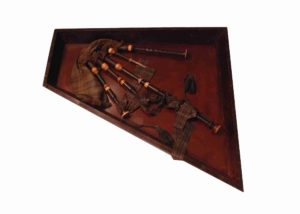Major-General David Stewart of Garth
Just before heading up the stairs to Gallery 4 visitors will see the painting of someone who, on first glance, might not look like a
Home » Blog » Soldier Stories » Poems from John Beaton




Held every year on 21st March, World Poetry Day was first declared by UNESCO in 1999 with the aim of supporting linguistic diversity and the opportunity for endangered languages to be heard. It is a day that celebrates poets and promotes the reading, writing and teaching of poetry.
This #WorldPoetry Day our Archive team share two poems written by Black Watch soldier, John McHardie Beaton, who served with the 5th Battalion in France during World War 1.
Lance Corporal John McHardie Beaton was born in 1894 in the Angus town of Kirriemuir. He was the youngest of 10 children born to Ann Beaton and William Beaton. In his early life he was employed as a chauffeur for his family’s neighbours. After the outbreak of World War 1, John and his older brothers, Archibald and David Beaton, who had both emigrated to Canada in the early 1900s, decided to join the Army. His older brothers served with the Canadian Expeditionary Force and John joined the 5th Battalion, The Black Watch. He was appointed Lance Corporal, and, after completing training, was deployed to France on 2nd November 1914.
John’s 3 poems were found in the letters sent home while serving in northern France. One of them was printed and sold locally for a penny in aid of the fund for sending tobacco and cigarettes to the 5th Battalion at the front. This poem, called “Weel Wullie” was written just a few days before his death. Unlike other famous poems written during this time John’s lines reflect the optimism of returning home, cheerfulness and the friendly banter between him and his comrades.
Less than a month after John’s death the 1st Kirriemuir Company of The Boys’ Brigade distributed copies of this poem and made £21. 7s. 4d. for the Comfort Fund which sent parcels to serving soldiers (this was the equivalent of 6 months average pay in 1915).
John’s second poem called, “We’re in the trenches, noo” gives insight into the everyday life of soldiers on the frontline. He shares details about the conditions he must endure, with the hot summer months approaching and the lack of “comforts” in the trenches – and just how much he misses his “ginger ale”! The poem ends on a positive note, with plans of returning home, which, unfortunately, he never did.
Sadly, John was killed on 9th May 1915 during the Battle of Aubers, aged only 21. This battle was one of the British Forces’ greatest tragedies during World War 1 with over 11,000 casualties, 800 of which were Black Watch soldiers. No ground, or tactical advantage was gained against the Germans.
John Beaton is buried at Fleurnaix, France. Of his two older brothers, Archibald was killed in action with the 29th Battalion, Canadian Expeditionary Force on 26th May 1916 while David survived the war.
The Black Watch Museum archive holds copies of two poems written by John. The third poem, and an extended family history with the story of the Beaton brother’s lives can be read at the Westmuir Village’s website.
Just before heading up the stairs to Gallery 4 visitors will see the painting of someone who, on first glance, might not look like a

Rosie Waine is the William Grant Foundation Research Fellow at the National Museum of Scotland. Here she writes how the Black Watch Museum & Castle
The Black Watch Museum archive holds a considerable quantity of primary source material relating to the Battle of Loos, 24th September 1915. This event has
Subscribe to Our Newsletter
© The Black Watch Castle and Museum
The Black Watch Regimental Trust is a charitable company registered in Scotland | Charity No: SC005848

2 thoughts on “Poems from John Beaton”
jones627@btinternet.com
You may find it useful to view the Trace a soldier (https://theblackwatch.co.uk/research/trace-a-soldier/) and Research pages (https://theblackwatch.co.uk/research/) on our website). Alternatively, we can undertake research on your behalf. Unfortunately, we do not have the resources to participate in unfunded research, we ask for a £10 non-refundable donation.
If you would like to proceed, please submit a research request form here – https://theblackwatch.co.uk/research/. You will then be routed to a page to make payment.
After we have received your completed research enquiry form and your payment a member of our research team will be in touch to discuss your enquiry. We will do our best to answer your enquiry but cannot guarantee that we will be able to do so.